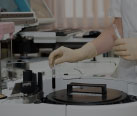
-
 COVID-19 detection kit developed by NCTU team detects protein, DNA, and antibodies for comprehensive disease detection and managementJanuary 13, 2021As positive cases of COVID-19 continue to... Read More
COVID-19 detection kit developed by NCTU team detects protein, DNA, and antibodies for comprehensive disease detection and managementJanuary 13, 2021As positive cases of COVID-19 continue to... Read More -
 100 Taiwan startups back to CES 2021 at TTA-VR PavilionJanuary 11, 2021Taiwan's success in fighting the COVID-19 pandemic has attracted Silicon Valley entrepreneurs... Read More
100 Taiwan startups back to CES 2021 at TTA-VR PavilionJanuary 11, 2021Taiwan's success in fighting the COVID-19 pandemic has attracted Silicon Valley entrepreneurs... Read More -
 Establish the Global Influence by a new generation of academic researchJanuary 8, 2021Ministry of Science and Technology (MOST) assists young... Read More
Establish the Global Influence by a new generation of academic researchJanuary 8, 2021Ministry of Science and Technology (MOST) assists young... Read More
The world’s society, economy, and scientific research efforts have been strongly affected by COVID-19 since it plagued the globe in 2020. More than 80 million people are infected with COVID-19 around the world up to the end of 2020. Countries have encountered economic recessions due to the pandemic. To contain the virus, governments around the world have been implementing different epidemic prevention measures, such as imposing lockdown, social distance, as well as strengthening the public health system including entry screening and contact tracing, in the hope to decrease the growth of mortality rate and the spread of the virus. ..... Read More
Reflections on the impact of COVID-19 around the globe
As the world has been hit hard by the Coronavirus compared to other countries, Taiwan has been able to minimize its impact and maintain its basic lifestyle and human interactions thanks to the government's proper prevention measures, the support of industry, academia, and research, and the trust and cooperation of the people. The research highlights in the January issue of the GASE newsletter focus on Taiwan's academic and industrial research to investigate the behavioral and psychological responses of the public to the Coronavirus incident. These studies include the rapid screening of super-sensitive dual antibodies, the rapid detection of antigens, the use of Coronavirus protein chips to unravel the mystery of infection, the use of hydrophobic biochar to inhibit the possibility of contact transmission of Coronaviruses, the rapid screening of viruses, and the rapid diagnosis of future respiratory failure in patients.
Taiwan's excellent performance in response to Coronavirus has become one of the global models for epidemic prevention, and Taiwan's accumulated experience in epidemic prevention will serve as an important foundation for the future fighting against emerging infections. In the post-epidemic era, Taiwan will accelerate the digital transformation of its medical industry, connect with the global biomedical industry, and build a resilient and smart government so that the next generation of Taiwan's medical technology industry will have better international competitiveness.

Editor in Chief
Ying-Shao Hsu (National Taiwan Normal University)

Guest Editors
Hsiang-Lin Liu (National Taiwan Normal University)















